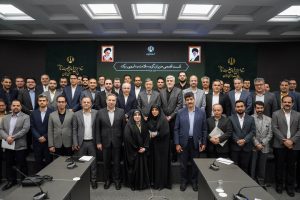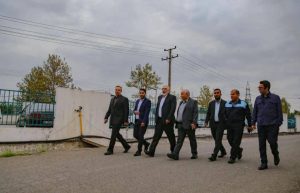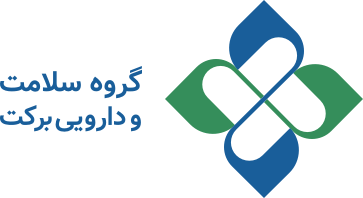
Occupational therapy: main branches of rehabilitation/ Special role in Iranian healthcare system
Barekat Health & Pharmaceutical Group: Occupational therapy, as one of the main branches of rehabilitation, plays a significant role in the improvement and empowerment of individuals with physical, mental, sensory, and social challenges.
Occupational therapy, as one of the main branches of rehabilitation, plays a significant role in the improvement and empowerment of individuals with physical, mental, sensory, and social challenges. This specialized field employs specific methods and techniques to assist individuals in regaining the skills necessary for performing daily activities and improving their quality of life. Occupational therapy not only focuses on the physical aspects of rehabilitation but also emphasizes psychological and social aspects, helping individuals achieve independence and optimal functioning, thereby enabling them to engage effectively in society.
In Iran, with the growing elderly population, the rise of chronic diseases, and the increasing prevalence of disabilities, the importance of occupational therapy has notably increased. Consequently, there is a growing need to expand occupational therapy services and increase access to these services. In recent years, the government and related organizations have made efforts to improve infrastructure and raise public awareness regarding occupational therapy, including the training of professional therapists, the development of therapy centers, and the implementation of support programs. However, challenges such as the shortage of specialized workforce and limited access to therapy services in certain regions still persist, which need to be addressed.
This report begins by examining the history of occupational therapy in Iran, followed by a discussion on its importance in improving individuals’ lives and the actions taken in this regard. It will also explore the challenges and future prospects of occupational therapy in Iran, concluding with a discussion on the role of World Occupational Therapy Day in raising public awareness.
History of Occupational Therapy in Iran
The introduction of occupational therapy to Iran dates back to the 1960s and 1970s. During these years, professionals who had studied abroad returned to Iran and began introducing this field into the country’s health and medical system. The first occupational therapy centers were established in hospitals and rehabilitation centers, and gradually, the services gained recognition among patients and physicians.
In recent decades, occupational therapy has been taught as a subfield of medical sciences in universities, and specialized training programs for the education of occupational therapists began. Today, Iranian occupational therapists are working in numerous healthcare centers, hospitals, and both private and public clinics, providing their services to those in need.
Importance of Occupational Therapy in Improving Quality of Life
Occupational therapy is one of the primary tools for assisting individuals who are restricted in performing daily activities due to physical, mental, or social challenges. This field is of great importance for various groups within society, including the elderly, children, individuals with brain and spinal injuries, and patients with mental disorders.
- Assisting the Elderly: Aging is often associated with mobility issues and a decrease in muscle strength, which can lead to difficulty in performing daily activities. Occupational therapy helps the elderly maintain their motor abilities, increase their independence, and improve their quality of life.
- Individuals with Brain and Spinal Injuries: People who have suffered disabilities due to stroke, accidents, or severe brain and spinal injuries benefit greatly from occupational therapy. Through targeted exercises and methods, occupational therapists help these individuals restore their motor and cognitive skills.
- Children with Developmental and Learning Disorders*: Occupational therapy is highly beneficial for children with autism, attention deficit hyperactivity disorder (ADHD), and learning disabilities. Special exercises and activities in occupational therapy help these children develop essential skills and perform better in school and social environments.
- Patients with Mental Health Issues: Individuals suffering from depression, anxiety, and other psychological disorders can benefit from occupational therapy. Therapeutic activities can help improve self-esteem, motivation, and social skills for these individuals.
- Individuals with Chronic Diseases: Chronic illnesses such as multiple sclerosis (MS) and Parkinson’s disease can disrupt daily life. Occupational therapy aids these patients in maintaining their capabilities and continuing to lead an active and independent life as much as possible.
Government Efforts in Promoting Occupational Therapy
In recent years, the Iranian government has undertaken several initiatives to support and promote occupational therapy services. Some of the most significant efforts include:
- Expansion of Occupational Therapy Centers: In recent years, occupational therapy centers have been established in hospitals and specialized clinics, both public and private. The government, in cooperation with the Ministry of Health and the Welfare Organization, strives to expand these centers nationwide, particularly in underserved and remote areas.
- Training Specialized Occupational Therapists: Given the community’s need for qualified occupational therapists, the government has partnered with universities and higher education institutions to create multiple educational and research programs in this field. These programs include undergraduate, master’s, and doctoral degrees and aim to increase the number of specialized professionals in the country.
- Insurance Support for Occupational Therapy Services: Due to the relatively high costs of occupational therapy services, they are not accessible to all segments of society. The government has implemented insurance schemes to expand coverage for occupational therapy services, improving access for those in need.
- Increasing Public Awareness: One of the main challenges in occupational therapy is the general lack of public awareness regarding its importance and applications. The government has launched educational programs through television broadcasts, awareness campaigns, and media outreach to increase public understanding of occupational therapy services.
- Supporting Scientific Research: The government also supports research in the field of occupational therapy, fostering the development of new treatment methods and improving service quality. These studies help enhance therapeutic techniques and elevate the scientific level of this field in the country.
World Occupational Therapy Day
World Occupational Therapy Day, celebrated annually on October 27th, is an opportunity to honor and raise awareness about the importance of occupational therapy. This day aims to increase public awareness, acknowledge the efforts of occupational therapists, and foster the exchange of knowledge and experiences among professionals in the field. In Iran, this day is typically commemorated with ceremonies and educational seminars, helping improve the scientific and practical knowledge of occupational therapists while also raising public awareness about the field.
Challenges Facing Occupational Therapy
Despite the advances and government efforts, occupational therapy in Iran still faces several challenges that require serious attention and solutions:
- Shortage of Specialized Workforce: Given the increasing demand for occupational therapy services, the number of qualified therapists in the country is still insufficient. Expanding the training of specialized professionals and increasing educational capacities can help address this issue.
- Lack of Advanced Equipment and Facilities: Some occupational therapy centers in Iran are still not equipped with the latest technology and tools, which impacts the quality of the services provided.
- Incomplete Insurance Coverage*: Occupational therapy services are not fully covered by insurance, which remains a barrier for many individuals in need of these services.
- Lack of Public Awareness*: A significant portion of the population remains unaware of the importance and applications of occupational therapy, which reduces the number of individuals seeking therapy services.
Role of Occupational Therapy in the Rehabilitation of Children and Adolescents
Occupational therapy plays a vital role not only for adults but also for children and adolescents. In children with developmental disorders, occupational therapy helps them acquire the essential skills needed for growth and progress in their daily lives. Disorders such as autism, learning disabilities, attention deficit hyperactivity disorder (ADHD) require regular and targeted occupational therapy. Occupational therapists assist these children by using play, purposeful activities, and interactive exercises to enhance their motor, social, and cognitive skills.
Moreover, for children who suffer from brain or physical injuries, occupational therapy can help restore their motor and functional abilities. These services also enable families to better cope with the challenges posed by their children’s disabilities.
Occupational Therapy & Post-Surgical , Accident Rehabilitation
Many patients, after undergoing complex surgeries or accidents, require occupational therapy to regain their motor and functional abilities. Occupational therapists help these patients through exercise programs and specialized techniques to accelerate their recovery. In Iran, with the rising number of road accidents, the demand for occupational therapy for these patients has also increased, highlighting the need for expanding occupational therapy services in the country.
Occupational therapy after orthopedic surgeries, such as joint replacements or spinal surgeries, is also crucial. These services help patients achieve better recovery and return to their normal lives after surgery.
Role of Occupational Therapy in Improving the Function of Individuals with Chronic Diseases
The treatment and management of chronic diseases, such as diabetes, arthritis, multiple sclerosis (MS), and Parkinson’s disease, require long-term support, and occupational therapy can effectively assist in improving the functionality of patients with these conditions. For example, occupational therapists help patients with Parkinson’s disease improve their daily movements and maintain their ability to perform various activities. These services contribute to pain relief, preventing skill deterioration, and improving the quality of life for these patients.
Importance of Education & Research in Occupational Therapy
Due to its complex nature, occupational therapy requires extensive education and research to keep up with new technologies and modern methods. Therefore, training occupational therapy specialists is a priority for governments and universities in developed countries. In Iran, the education of professional occupational therapists in academic centers and the offering of specialized courses and internships for students in this field have contributed to the development of a high-quality workforce.
Research in various aspects of occupational therapy, including new rehabilitation methods, assistive tools and technologies, and targeted therapy programs, also plays a role in increasing the effectiveness of occupational therapy services. The Iranian government, by supporting scientific research in this field, has contributed to the development of therapeutic methods and the improvement of the quality of occupational therapy services.
New Technologies in Occupational Therapy
With the advancement of technology, new tools and equipment have entered the field of occupational therapy, helping to improve the quality and accuracy of treatments. Currently, advanced assistive devices such as rehabilitation robots, virtual reality, and motion sensors are being used in many countries. The use of virtual reality technology in occupational therapy can assist patients in engaging in physical exercises in simulated environments and track their progress.
Iran, given its expanding technology industry, has also made efforts to integrate these tools into occupational therapy centers. This too ls help therapists implement treatment programs more accurately and have positive effects on patient recovery.
Importance of Mental Health of Occupational Therapists
One often-overlooked aspect of occupational therapy is the mental health of the therapists themselves. Professionals in this field, due to working directly with patients who have disabilities and complex issues, may experience burnout. Therefore, focusing on the mental well-being of occupational therapists and providing them with supportive and educational programs can improve the quality of care and reduce stress and work pressure.
Organizing training courses for occupational therapists, providing psychological counseling, and addressing their mental health needs are actions that can enhance the well-being of therapists.
Conclusion
Occupational therapy, as a branch of rehabilitation, significantly contributes to improving the quality of life for individuals struggling with physical and mental challenges. This field plays a special role in the Iranian healthcare system by offering effective therapeutic methods, assisting in skill restoration, and enhancing individuals’ independence in society. The Iranian government, through its efforts to expand occupational therapy and support this sector, has made these services more accessible to various segments of society.
Furthermore, the use of new technologies and reliance on scientific research can further improve the quality of occupational therapy services in the country. However, the existing challenges require more precise planning and greater support from the government and related institutions to ensure a brighter future for occupational therapy in Iran and to foster a capable and independent society.
-
Voice of Life in World of News — Redefining Health Journalism in the Information Age

-
Senior Health Officials & Barkat GD Visit Sobhan Oncology

-
Barkat Group specialized meeting

-
Safa Appointed as Barekat General Director

-
Barekat Health & Pharmaceutical Group at the 10th Iran Pharma Exhibition

-
Ali Safa visits Sobhan Oncology & Sobhan Darou

-
Pirsalehi & Safa visit Saman Daroo 8 Knowledge-based Company

-
Barekat Managing Director Visits Samen Pharmaceutical Company

